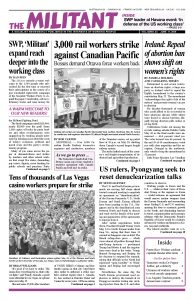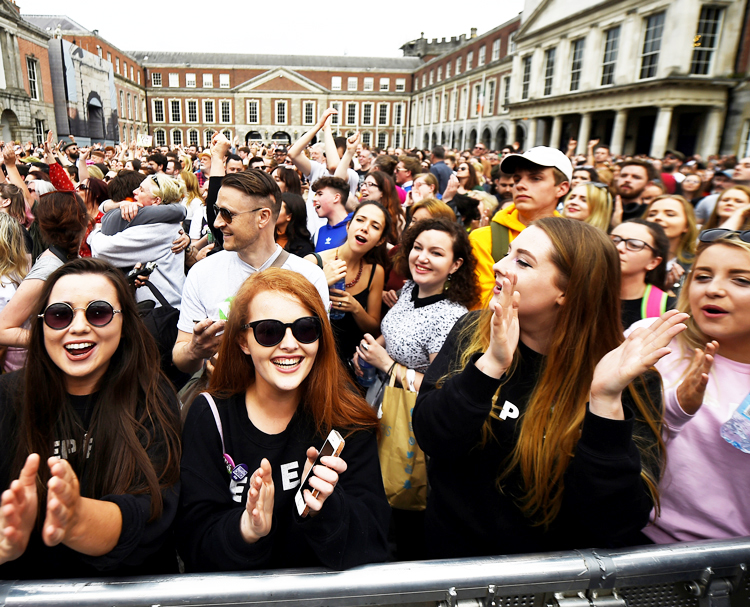Determined to end severe restrictions on abortion rights, a large majority in Ireland voted to repeal the Eighth Amendment to the country’s constitution May 25. The amendment “acknowledges the right to life of the unborn” and prevents women’s access to abortion.
For decades thousands of women who could afford to do so traveled to have abortions abroad, while others were forced to choose between illegally buying abortion pills online or giving birth.
Celebrations broke out among the crowds waiting outside Dublin Castle May 26 as the final results were announced — 66.4 percent voted yes. The voter turnout was 64 percent. In the end 39 of 40 constituencies voted yes with clear majorities and the exception, Donegal in the northwest, only voted to keep the amendment by 52 percent.
Irish Prime Minister Leo Varadkar says his government will introduce a law to allow abortion, but will impose a time limit of up to 12 weeks of pregnancy and up to 24 weeks in “exceptional” circumstances.
The vote is a reflection of the deep-going changes in the outlook of women and men to the fight for women’s rights coming out of the integration of women into the workforce. This has occurred in Ireland as it has in many other parts of the capitalist world.
The number of working women in Ireland jumped 20 percent since 1993. Restrictions on the sale of contraception were dropped in 1993, divorce was legalized in 1996, votes in 1992 and 2002 altered the law to permit abortion if a woman was deemed a suicide risk, and same sex marriage was legalized by a 62 percent vote in 2015.
Broad campaign
“This result is bigger than Ireland. We know the world watches us as abortion access is being eroded in other places,” said Linda Kavanagh, spokesperson for the Abortion Rights Campaign, part of the coalition that led the efforts to repeal the amendment.
The fight heated up after Savita Halappanavar, a 31-year-old dentist, died on Oct. 28, 2012, after University Galway Hospital authorities refused to give her an abortion. She went to the hospital in extreme pain as she was having a miscarriage. She got septicemia, several organs began to fail, but hospital authorities refused to save her life.
Within weeks protests were mounted in towns across Ireland. Some 10,000 people marched in Dublin, protesting her death and the constitution’s onerous restrictions on access to abortion.
In September and October 2017 demonstrations in Dublin, Belfast and London mobilized growing support for changing the law. Over 30,000 marched in Dublin.
Responding to the growing support for the campaign for abortion rights, Varadkar announced the referendum Jan. 29. Since then, thousands of women and men have been involved in street campaigning from tables in town centers and door to door.
Marissa McMahon who works in Belfast, traveled with others from Northern Ireland to the Irish Republic to campaign in Drogheda with “Together for Yes” for two weekends. “We did not quite know what to expect canvassing door to door, and in rural and working-class areas,” she told the Militant in a phone interview May 27. “But we were welcome, we never encountered a hard ‘No’ with no possibility to have a discussion. On the contrary, women would come out and tell us their personal stories.”
After the referendum results were announced, John McGuirk, a spokesman for Save the 8th campaign, said that his group would continue to fight against women’s access to abortion “if and when abortion clinics are opened in Ireland.”
‘The North is next’
“The pressure is on for the North now,” McMahon said. “When I walked through the center of Belfast last night with my ‘Repeal’ hoodie on, I was greeted by all kinds of people, and a lot of young guys especially were giving me high fives.”
The 1967 Abortion Act made abortion widely available in Britain under the National Health Service. But the law does not apply in Northern Ireland, where women seeking abortions can face life in prison, and doctors who perform them face five years. As a result hundreds of women travel to Britain each year.
Since the referendum result became known, there have been calls for a change of legislation in Northern Ireland by the Alliance Party, the Social Democratic and Labour Party and Sinn Fein, while the Democratic Unionist Party remains opposed. In April the Belfast City Council decided to decriminalize the use of abortion pills.
Hundreds attended a rally at Belfast City Hall May 28 calling for abortion rights in Northern Ireland. They chanted, “Our bodies, our lives, our right to decide.”


